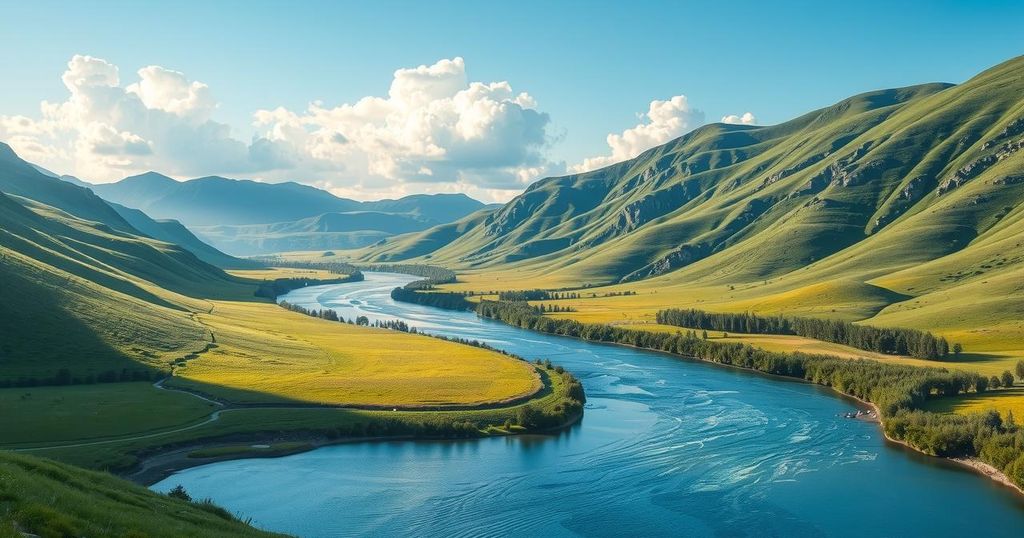Goma witnesses renewed gunfire as the DRC accuses Rwanda of sending troops to support the M23 rebel group. Tensions escalate amid calls for UN intervention and a planned peace summit between DRC and Rwanda. The situation further complicates regional stability, with significant casualties reported among foreign peacekeepers as fighting continues.
Early Monday morning, gunfire erupted in Goma, the capital of North Kivu province in the Democratic Republic of Congo (DRC). This escalation comes as the DRC accused Rwanda of deploying additional troops to support the M23 group, intensifying the conflict that has persisted for decades in this region. Large explosions were reported throughout the city following a period of tension leading up to a planned peace summit between DRC President Felix Tshisekedi and Rwanda’s President Paul Kagame.
The ongoing battle for Goma signifies a continued struggle in eastern DRC, marked by ethnic conflicts and armed militia disputes. The M23, allegedly backed by Rwandan forces, has engaged in fierce clashes with Congolese military and UN peacekeepers. The DRC has condemned Rwanda’s actions, calling for UN sanctions against Rwanda for its alleged involvement with the M23 rebels.
The United Nations Security Council recently urged the withdrawal of external military forces but did not directly name Rwanda. Congolese diplomats have warned of the growing Rwandan military presence along the border, labeling it a “declaration of war.” Reports indicate that between 500 and 1,000 Rwandan troops crossed into DRC, further complicating the deteriorating situation.
Following the escalation, both the DRC and Rwanda have retracted their diplomatic representatives from each other’s capitals. The tensions have prompted a summit discussion among leaders of the East African Community to address the crisis. Amidst this turmoil, the UN Secretary-General has called on Rwanda to withdraw its forces from the DRC, a plea that Rwanda has rejected, citing national security concerns regarding the ongoing conflict near its border.
Over the past few days, foreign peacekeeper casualties have risen, with reports stating that 13 soldiers have been killed, including members of a Southern African regional peacekeeping mission. Historically, the M23 has previously seized Goma but was defeated in 2013 and had regrouped since then. Multiple ceasefires have taken place, yet peace remains elusive in the region as the humanitarian crisis continues to unfold amidst the violence.
The article outlines the deteriorating situation in Goma, highlighting the accusations between the DRC and Rwanda, which have heightened tensions in the eastern region. The conflict has a long history, rooted in ethnic rivalries, regional instability, and complex geopolitical factors involving numerous militia groups. The battle for Goma is a significant flashpoint due to its strategic importance and the presence of rich mineral resources, further fueling the conflict. The involvement of international bodies such as the UN highlights the global diplomatic efforts required to address the situation, as combating armed groups and foreign military presence remains critical to achieving long-term peace in the region. Additionally, the humanitarian impact of the conflict is evident, with the loss of lives among peacekeepers and the plight of the local population becoming a pressing concern. The events unfolding in Goma reflect broader patterns of conflict in eastern DRC, characterized by cycles of violence and failed peace agreements. The regional geopolitical implications also pose challenges to stability in the Great Lakes region, demanding concerted efforts from neighboring countries and the international community to seek sustainable resolutions.
In summary, the situation in Goma illustrates a critical juncture in the ongoing conflict in eastern DRC, exacerbated by accusations of foreign military involvement, intensified fighting, and the dire humanitarian crisis faced by local residents. Diplomatic efforts, such as the upcoming summit involving DRC and Rwanda, are essential in addressing these tensions. The international community’s response, particularly from the UN, will significantly influence the course of this conflict, aiming for peace and stability in a troubled region.
Original Source: www.news-expressky.com






